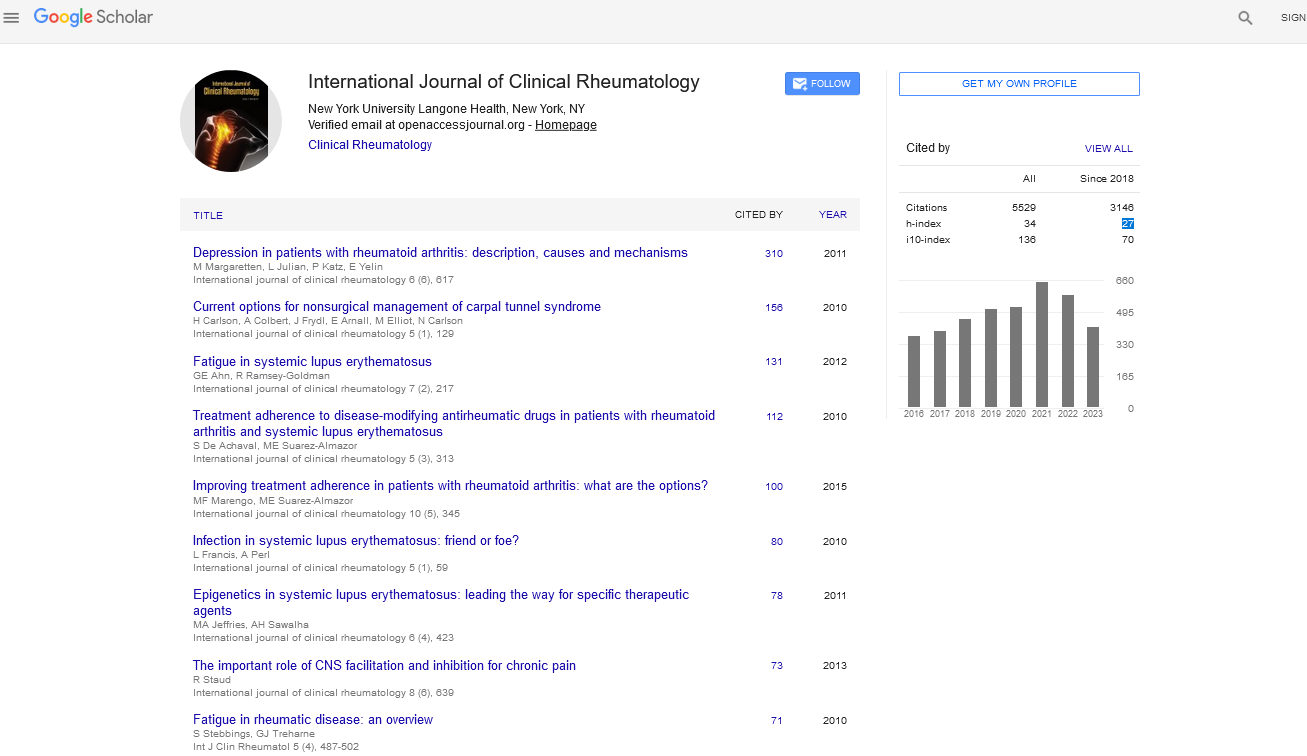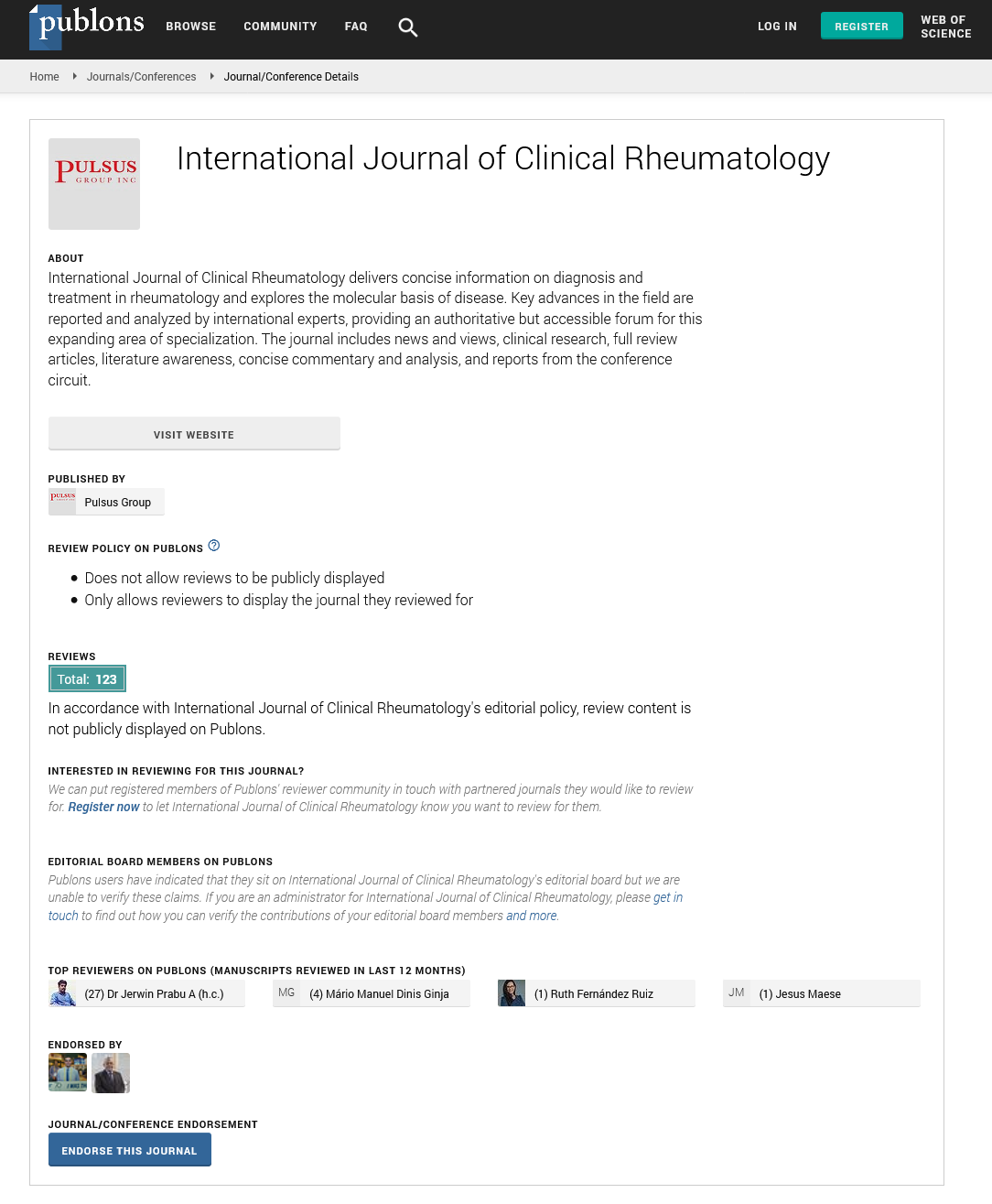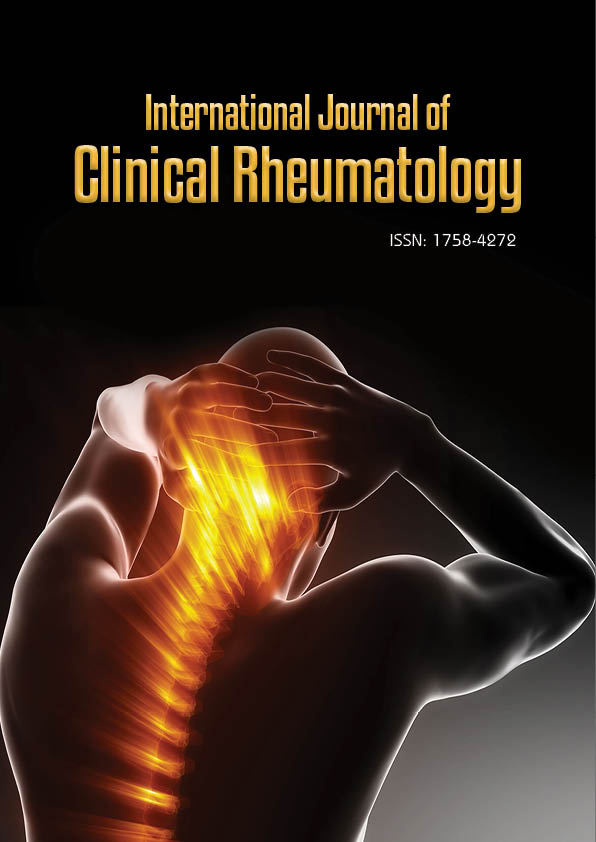Short Communication - International Journal of Clinical Rheumatology (2024) Volume 19, Issue 3
Unraveling the Enigma of Antiphospholipid Syndrome: Causes, Symptoms, Diagnosis, and Management
Afomia Vorsek*
Department of Neurology, Hawassa University, Haiti
- *Corresponding Author:
- Afomia Vorsek
Department of Neurology, Hawassa University, Haiti
E-mail: afomia56@yahoo.om
Abstract
Antiphospholipid syndrome (APS) is a complex autoimmune disorder characterized by the presence of antiphospholipid antibodies in the blood, which can lead to recurrent thrombosis (blood clots) and pregnancy complications. This condition, also known as Hughes syndrome, can affect individuals of all ages and genders, presenting a myriad of symptoms that can be challenging to diagnose and manage. In this article, we will delve into the intricacies of antiphospholipid syndrome, exploring its causes, symptoms, diagnosis, and management strategies.
Keywords
APS • joint pain • Rheumatology
Introduction
Antiphospholipid syndrome is an autoimmune disorder in which the body's immune system mistakenly produces antibodies that target phospholipid-binding proteins found in cell membranes and blood vessels. These antiphospholipid antibodies, including lupus anticoagulant, anticardiolipin antibodies, and anti-beta-2-glycoprotein-I antibodies, can interfere with normal blood clotting processes, leading to an increased risk of thrombosis [1-3].
Methodology
In addition to thrombosis, antiphospholipid antibodies can also cause pregnancy complications such as recurrent miscarriages, stillbirths, preterm births, and intrauterine growth restriction. The exact mechanisms by which antiphospholipid antibodies contribute to these complications are not fully understood but may involve impaired placental blood flow and fetal thrombosis. The symptoms of antiphospholipid syndrome can vary widely from person to person and may include:
Deep vein thrombosis (DVT): Blood clots that form in the deep veins of the legs or arms, causing swelling, pain, and tenderness.
Pulmonary embolism (PE): Blood clots that travel to the lungs, causing chest pain, shortness of breath, and difficulty breathing.
Stroke: Blood clots that block blood flow to the brain, leading to sudden weakness, numbness, confusion, and difficulty speaking or understanding speech.
Transient ischemic attack (TIA): Brief episodes of neurological symptoms, such as weakness or numbness on one side of the body, that resolves within 24 hours.
Pregnancy complications: Recurrent miscarriages, stillbirths, preterm births, and intrauterine growth restriction due to placental insufficiency and fetal thrombosis [4-6].
Diagnosis of antiphospholipid syndrome: Diagnosing antiphospholipid syndrome can be challenging, as it requires a combination of clinical evaluation, laboratory testing, and imaging studies. Healthcare providers typically use the following criteria to diagnose APS:
Clinical criteria: Evidence of thrombosis or pregnancy complications associated with antiphospholipid antibodies.
Laboratory criteria: Persistent presence of antiphospholipid antibodies, including lupus anticoagulant, anticardiolipin antibodies, and anti-beta-2-glycoprotein-I antibodies, on two or more occasions at least 12 weeks apart.
Imaging criteria: Imaging studies such as Doppler ultrasound, computed tomography (CT) scans, or magnetic resonance imaging (MRI) may be performed to confirm the presence of thrombosis.
Management of antiphospholipid syndrome: Treatment for antiphospholipid syndrome aims to prevent thrombosis, manage symptoms, and reduce the risk of pregnancy complications. Depending on the individual's clinical presentation and medical history, treatment may include:
Anticoagulant therapy: Anticoagulant medications such as warfarin, heparin, or direct oral anticoagulants (DOACs) are commonly used to prevent blood clot formation and reduce the risk of thrombosis in individuals with APS.
Antiplatelet therapy: Aspirin may be prescribed to individuals with APS who have a history of arterial thrombosis or recurrent miscarriages, as it helps prevent platelet aggregation and reduce the risk of clot formation [7-9].
Pregnancy management: Pregnant individuals with APS may require close monitoring and specialized care to minimize the risk of pregnancy complications. This may involve anticoagulant therapy, aspirin therapy, and regular fetal monitoring to assess placental function and fetal well-being.
Lifestyle modifications: Adopting a healthy lifestyle that includes regular exercise, a balanced diet, smoking cessation, and avoiding excessive alcohol consumption can help reduce the risk of thrombosis and improve overall health outcomes in individuals with APS.
Patient education and support: Educating individuals with APS about their condition, treatment options, and lifestyle modifications is essential for empowering them to actively participate in their care and make informed decisions about their health.
Living well with antiphospholipid syndrome
Living with antiphospholipid syndrome can present challenges, but with proper management and support, individuals with APS can lead fulfilling and productive lives. Key tips for living well with APS include: Maintain open communication with your healthcare provider and follow your treatment plan diligently. Educate yourself about APS and become an advocate for your own health. Take steps to reduce your risk of thrombosis by adopting a healthy lifestyle and adhering to prescribed medications. Seek support from family, friends, and support groups to cope with the emotional and psychological impact of living with a chronic condition. Stay informed about the latest research and treatment advances in APS to ensure that you receive the best possible care [10].
Conclusion
In conclusion, antiphospholipid syndrome is a complex autoimmune disorder characterized by the presence of antiphospholipid antibodies and an increased risk of thrombosis and pregnancy complications. With early diagnosis, personalized treatment, and lifestyle modifications, individuals with APS can effectively manage
their condition and lead fulfilling lives. By raising awareness, promoting research, and providing support, we can empower individuals with APS to thrive despite the challenges posed by this condition.
References
- Yoshiura K, Kinoshita A, Ishida T et al. A SNP in the ABCC11 gene is the determinant of human earwax type. Nat Genet. 38, 324-30 (2006).
- Slavkin, Harold C. Evolution of the scientific basis for dentistry and its impact on dental education, past, present, and future. Journal of Dental Education. 76, 28-35(2012).
- Leggat PA. Occupational hygiene practices of dentists in southern Thailand. International Dental Journal. 51, 11-16(2001).
- Lennon MA. One in a million: the first community trial of water fluoridation. Bulletin of the World Health Organization. 84, 759-760(2006).
- Huang ES, Brown SE, Ewigman BG et al. Patient perceptions of quality of life with diabetes-related complications and treatments. Diabetes Care. 30, 2478-2483 (2007).
- Huang ES, Brown SE, Ewigman BG et al. Patient perceptions of quality of life with diabetes-related complications and treatments. Diabetes Care. 30, 2478-2483 (2007).
- Reynolds A, Mann J, Cummings J et al. Carbohydrate quality and human health: a series of systematic reviews and meta-analyses. Lancet. 393, 434-445 (2019).
- Carrillo JE, Carrillo VA, Perez HR et al. Defining and targeting health care access barriers. J Health Care Poor Underserved. 22, 562-75 (2011).
- Jones G, Steketee RW, Black RE et al. How many child deaths can we prevent this year? Lancet. 362, 65-71 (2003).
- Lvovs D, Favorova OO, Favorov AV et al. A Polygenic Approach to the Study of Polygenic Diseases. Acta Naturae. 4, 59-71 (2012).
Indexed at, Google Scholar, Crossref
Indexed at, Google scholar, Crossref
Indexed at, Google Scholar, Crossref
Indexed at, Google Scholar, Crossref
Indexed at, Google Scholar, Crossref
Indexed at, Google Scholar, Crossref
Indexed at, Google Scholar, Crossref
Indexed at, Google Scholar, Crossref
Indexed at, Google Scholar, Crossref


